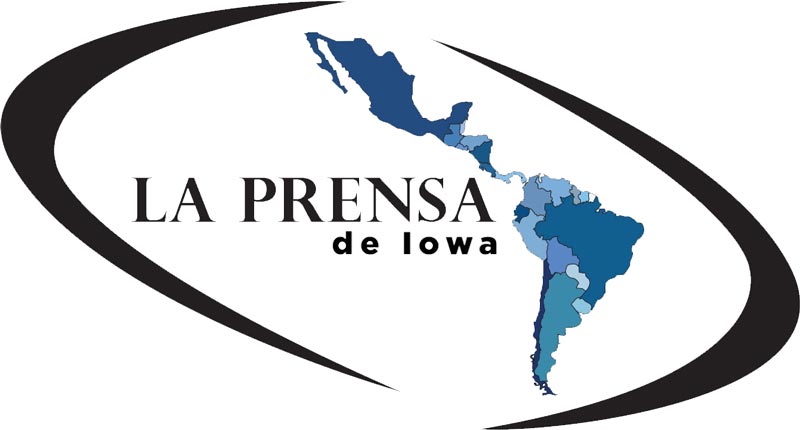Nativa de Denison ayuda a refugiados a nivel mundial
/La hija de Denison, Jane Olson personalizó con su firma y dedicatoria a la basta audiencia que participó durante la exposición del libro que ella escribió “Word citizen” Journeys of a Humanitarian” donde narra la historia de centenares de personas sobrevivientes de las mas injustas guerras alrededor del mundo; donde ella no solamente fue un testigo viviente del dolor del dolor de la injusticia humana sino que con su trabajo en diferentes organizaciones internacionales ayudó a minimizar el dolor de la humanidad.
Gordon Wolf
Especial para LA PRENSA Iowa
Si los pequeños pasos tomados temprano en la vida realmente conducen más tarde a pasos más largos, no podría encontrar un mejor ejemplo que Jane Olson.
Al crecer en Denison, Olson tomó decisiones que la llevaron de la ciudad sede del condado de Crawford County, Iowa, a naciones de todo el mundo en una búsqueda para mejorar las vidas de personas, y la inhumanidad del hombre hacia el hombre.
El 8 de mayo, Olson regresó a la biblioteca de su ciudad natal, Library Norelius Community, para presentar una charla sobre su vida y su libro, “World Citizen, Journeys of a Humanitarian” (Ciudadano del mundo, viajes humanitarios, por su traducción al español).
Al escuchar a Jane hablar y leer su libro, se pueden conectar fácilmente los puntos que llevaron al segundo hijo de Lester y Lorraine Tenhulzen de Denison a Nicaragua, Cuba, los países de la ex Unión Soviética y Uganda.
Jane Olson posando en la foto de graduación de 1960 de la High School de Denison, donde ella aparece a la edad de 17 años.
Por supuesto, nada de eso fue planeado.
"Sabes, la vida a veces te llega con una cosa a la vez", explicó Olson en la sala de la biblioteca que estuvo llena de miembros de la audiencia. “Realmente no te sientas y planeas ir a zonas de guerra y trabajar con organizaciones que están sanando a las personas y ayudando a las personas que sufrieron abusos graves”.
El entorno de la biblioteca fue para Jane, como volver a la infancia de la sala de su casa. Cuando era niña, ella y sus dos hermanas, Judy y Cynthia, pasaban incontables horas leyendo en la biblioteca mientras su madre practicaba en el órgano de la Iglesia Presbiteriana, que entonces estaba al otro lado de la calle.
“Este lugar realmente inspiró mi interés en el mundo”, dijo. "Inspiró mi hábito de llevar un diario, porque, por supuesto, como toda otra adolescente, leí 'el diario de Ana Frank' y me di cuenta de lo importante que era capturar tus palabras y sentimientos en un diario, y si no hubiera escrito diarios en todo el mundo, no hubiera podido de escribir este libro.”
Jane dijo que su tiempo en la biblioteca le enseñó la gran importancia a la comunidad porque la mayoría de las personas llegaban biblioteca, lo que la convertía en el lugar donde las personas se reunían y compartían sus pensamientos sobre los libros que estaban leyendo.
Su crianza en Denison le proporcionó valores y modelos a seguir, escribió Jane en su libro.
Como una adolescente periodista empírica, Jane desarrolló un interés en contar las historias de la vida de las personas. Había convencido al editor de la publicación quincenal Denison Bulletin and Review, Dick Knowles, de que sin importar lo que le pagara, ella valdría la pena. Tenía 15 años en ese momento y le pagaban en efectivo hasta que cumplió los 16.
A Jane se le asignó la tarea de escribir obituarios y ella reconoció que todos, sin importar su estatus social o riqueza, merecían al menos tres párrafos en el obituario, para poder contar la historia de sus vidas.
Entre los cursos a nivel secundario y universitario que tomó, dos se destacaban en su mente por ser fundamentales para llevarlos a cabo en la búsqueda humanitaria por el mundo. Ella dijo que George Dobrolvony, quien enseñó historia mundial en Denison High School, hizo que el tema cobrara vida inspirando su interés en la historia mundial y las guerras.
En la Universidad de Nebraska, su profesora de escritura creativa le dijo: “Si quieres escribir algo que importe, entonces vive una vida que importe.” Una frase que hace que Jane llore cuando la repite.
“Cuando me senté a escribir este libro me di cuenta de que había seguido ese consejo”, expresó.
Incluso la autoría de “World Citizen, Journeys of a Humanitarian” fue desencadenada por otro suceso aparentemente inconexo. Hace seis años, Jane se encontraba bajando rápidamente unos escalones en calcetines, se resbaló y se rompió un tobillo. Confinada a una silla de ruedas, finalmente tuvo tiempo de cumplir su deseo de transformar sus diarios en el libro.
Y, como los obituarios que escribió cuando era una periodista adolescente, es lo que “World Citizen” se trata, dijo Jane, de un libro centrado en las historias de personas: en este caso, personas que fueron sobrevivientes de los horrores de la violencia, la tortura, la violación y el secuestro en países devastados por la guerra en todo el mundo, pero al mismo tiempo, personas que se negaron a ser víctimas.
Jane Olson al lado de su esposo Ron Olson, nativo de ManilLa.
Lo que le permitió a Jane la independencia para viajar por el mundo como miembro de organizaciones humanitarias fue una de las mejores decisiones que tomó: casarse con un joven de Manilla, Ron Olson. Ron se convirtió en abogado de un bufete iniciado por Charlie Munger, quien era socio de Warren Buffet en Berkshire Hathaway. Ron y Jane celebrarán su 59 aniversario en junio, un matrimonio no solo de amor mutuo, sino también de raíces y valores compartidos y el amor por viajar por el mundo. Jane compartió que simplemente llevó sus viajes a un nivel "superior".
El trabajo de Ron llevó a los Olson al sur de California, y en lugar de vivir en Los Ángeles, eligieron el entorno más rural de Pasadena. Eso condujo a otra decisión clave que eventualmente llevó a Jane a su búsqueda humanitaria. No pudieron encontrar una iglesia luterana, que era la religión de Ron o una iglesia presbiteriana que era la de Jane. En cambio, encontraron un hogar en la Iglesia Episcopal de Todos los Santos, reconocida en todo el país como una iglesia progresista de paz y justicia con una gran visión del mundo. También fue muy activa en el movimiento de derechos civiles y se opuso a la guerra en Vietnam por razones teológicas, dijo.
La Iglesia Episcopal de todos los Santos tenía una serie de programas, todos dirigidos por miembros de la iglesia que ofrecían su tiempo.
Un programa en el que Jane se involucró se centraba en revertir la carrera armamentista de la Guerra Fría entre la Unión Soviética y los Estados Unidos, lo que aumentó su interés en las relaciones entre la Unión Soviética y EE.UU.
Ella dijo que a principios de la década de 1980 se produjo una migración masiva de Centro América hacia la frontera sur de California. Se trataba de personas provenientes principalmente de Nicaragua y El Salvador, en busca de asilo por la guerra que se desarrollaba en esos países.
“Era realmente una guerra de poder entre Estados Unidos y la Unión Soviética, utilizando a los pueblos de Nicaragua y El Salvador como una especie de títeres,” dijo Jane. “No podíamos luchar entre nosotros porque teníamos suficientes armas nucleares para acabar con toda la vida en la tierra.”
La iglesia de Todos los Santos se convirtió en una iglesia santuario y además envió una delegación a Nicaragua y El Salvador para experimentar cómo eran realmente las condiciones en esos países, hablar con la gente e investigar qué estaba leyendo la gente en los periódicos. Jane fue miembros de esa delegación.
“Me encantó especialmente conocer a la gente”, dijo, “y escuchar sobre sus miedos y los peligros allí, y sus bajas expectativas de seguridad y la calidad de vida de la que huían.
“Decidí que eso era realmente lo que quería hacer, ir a países que sufrían guerras u otras calamidades, reunirme con personas, aprender lo que estaban experimentando y volver y contar sus historias.”
Pero Olson tuvo que dejar ese interés en suspenso mientras se dedicaba a su trabajo favorito, el de ser madre de los tres hijos que procreo con Ron. “Me di cuenta de que era lo único que nunca tendría otra oportunidad de hacer,” dijo. “Mientras criaba a nuestros tres hijos, cada semana pasaba muchas horas voluntariado para organizaciones que ofrecían servicio a personas vulnerables,” dijo Olson a La Prensa. “No tienes que ir al extranjero para encontrar la necesidad y estar al servicio.”
“Me ofrecí como voluntaria en Head Start, un centro de servicios de VIH/SIDA, programas que ayudaba a personas sin hogar, leí libros a personas mayores en centros para personas mayores, serví como líder de Brownie Scout y Girl Scout, lideré un programa importante que se centró en los desafíos de la Guerra Fría entre los EE. UU. y la Unión Soviética y los costos de la carrera armamentista nuclear; y muchas otras causas. Así es como aprendí y también gané la confianza para los muchos viajes de mi vida.”
El día que Ron llevó al menor de sus hijos a la universidad, Jane estaba en un avión
a Moscú.
“Ese fue el inicio de mis viajes que siguieron creciendo y creciendo,” dijo.
“World Citizen, Journeys of a Humanitarian” está lleno de historias de personas que enfrentan dificultades y horrores en Ucrania, otras naciones del antiguo bloque soviético, Nicaragua, Cuba y Uganda, pero también las historias de sus esperanzas y determinación.
Durante la guerra étnica en ex Yugoslavia, Jane se reunió especialmente con mujeres y aprendió estadísticas que cambiaron el enfoque para ayudar a las personas.
“El ochenta por ciento de los refugiados son generalmente mujeres y niños, organizamos un grupo humanitario llamado Women’s Commission for Refugee Women and Children (Comisión de Mujeres para Mujeres y Niños Refugiados), lo que ahora es Women’s Refugee Commission,” dijo Olson. “Fui como voluntaria y presidente de la junta a los asentamientos de refugiados para conocer de las mujeres y hablar con ellas.”
“Descubrí que la mayoría de los trabajadores humanitarios internacionales eran hombres, y la mayoría de los refugiados eran mujeres. También aprendí que las mujeres no se comunicaban con los hombres, especialmente las mujeres musulmanas, por razones culturales.”
Cuando The Women’s Refugee Commission entra en los asentamientos de refugiados, aprende cuáles son las condiciones físicas del lugar, y descubre cuántas personas son ancianos, cuántas son las mujeres embarazadas, el número de mujeres lactantes y el número de niños.
“Regresábamos y escribíamos informes y abogábamos por los refugiados ante las organizaciones internacionales, agencias de las Naciones Unidas y organizaciones humanitarias”, explicó Jane.
Jane también dijo que no es experta en ninguno de los esfuerzos humanitarios. “Pero fui madre, y luego abuela, y lo que me di cuenta es que una mamá es exactamente lo que todo el mundo necesita”, dijo. “Es la energía, el amor, los cuidados, la preocupación y la intuición de una madre es lo que ellos [los refugiados] necesitaban, y me sentaba en silencio y las mujeres comenzaban a contarme sus historias. Para mí fue una verdadera lección.”
Jane dijo a La Prensa que un rasgo común entre todos los países devastados por la guerra que visitó es que casi todos los conflictos o guerras comenzaron debido a líderes impulsados por la codicia y el deseo de poder autoritario, poder sobre los demás, junto con una indiferencia y total falta de respeto por las víctimas de la violencia.
En contraste con estas oscuras intenciones está la resiliencia de las personas.
“Habiendo viajado a algunos de los lugares más oscuros del mundo, he aprendido la interconectividad de todos los seres humanos,” dijo Olson. “A menudo me veía en víctimas que habían sufrido pérdidas y abusos inimaginables, que se aferraban a la esperanza y se veían a sí mismos como sobrevivientes, no como víctimas.
“Es importante no exaltar a ‘la víctima’ o exagerar su condición”, continuó, “pero conocí a personas increíbles que me inspiraron y me enseñaron lo que significa ser un ser humano.”
El libro de Jane Olson se encuentra en Norelius Library, tambien se puede obtener en las tiendas de libros y en línea.
Translation
Denison native Jane Olson uses her Midwestern values to help refugees worldwide
Denison native Jane Olson signed copies in the Norelius Library of a book she authored, “World Citizen: Journeys of a Humanitarian,” in which she tells the stories of survivors of wars around the world; where she was not only a living witness to the pain of human injustice, but through her work in different international organizations, helped to minimize the pain of humanity. Olson delivered remarks on the book prior to the book signing.
Gordon Wolf
Special for LA PRENSA Iowa
If small steps taken early in life truly lead to longer strides taken later, you could not find a better example than Jane Olson.
Growing up in Denison, Olson made choices that took her from the county seat town of Crawford County, Iowa, to nations throughout the world in a quest to improve the lives of those subjected to man’s inhumanity to man.
On May 8, Olson returned to her hometown library – Norelius Community Library – to present a talk on her life and her book, “World Citizen, Journeys of a Humanitarian.”
Listening to Olson speak and reading her book, you can readily connect the dots that took the second child of Lester and Lorraine Tenhulzen from Denison to Nicaragua, Cuba, former Soviet Union countries and Uganda.
Of course, none of it was planned.
“You know, life comes at you one thing at a time,” Olson explained to a library room full of audience members. “You really don’t sit down and plan to go to war zones and work with organizations that are healing people and helping people who suffered grievous abuse.”
The library setting was, for Olson, like coming home to her living room. As a child, she and her two sisters, Judy and Cynthia, spent countless hours reading at the library while her mother would practice the pipe organ at the Presbyterian Church, which was then across the street.
“This place really inspired my interest in the world,” she said. “(It inspired) my habit of keeping a journal, because, of course like every other adolescent girl, I read ‘the diary of Anne Frank,’ and I realized how important it was to capture your words and feelings in a journal, and if I hadn’t kept journals all around the world, I wouldn’t have been able to write this book.”
Olson said her time at the library taught her the importance of community because everyone would come to the library, making it the great leveling place where people would meet and share thoughts on books they were reading.
Her upbringing in Denison provided her with values and role models, Olson wrote in her book.
As a teenage journalist, Olson developed an interest in telling the stories of people’s lives. She had convinced the publisher of the biweekly Denison Bulletin and Review, Dick Knowles, that no matter what he paid her she would be more than worth the price. She was 15 at the time and had to be paid out of petty cash until she turned 16.
Olson was assigned to write obituaries, and she recognized that everyone, no matter their social status or wealth, deserved at least three paragraphs in their obituary, to convey the story of their lives.
Jane Olson posing in the 1960 Denison High School graduation photo, where she appears at the age of 17.
Among the high school and university-level courses that Olson took, two stand out in her mind as being instrumental in taking her on her humanitarian quest around the world. She said that George Dobrolvony, who taught world history at Denison High School, made the subject come alive and inspired her interest in world history and wars.
At the University of Nebraska, her creative writing professor said, “If you want to write something that matters, then live a life that matters,” a sentence that nearly causes Olson to tear up when she repeats it.
“I realized when I sat down to write this book that I had followed that advice,” she said.
Even the authoring of “World Citizen, Journeys of a Humanitarian” was triggered by another seemingly unconnected occurrence. About six years ago Olson was running down some steps in her stocking feet, slipped and broke an ankle. Confined to a wheelchair, she finally had time to fulfill her desire to transform her journals into the book.
And, like the obituaries she wrote as a teenaged journalist, that’s what “World Citizen” is about, Olson said, a book focused on the stories of people – in this case people who were survivors of the horrors of violence, torture, rape and kidnapping in war-torn countries throughout the world, but at the same time, people who refused to be victims.
What allowed Olson the independence to travel the world as a member of humanitarian organizations was one of the best decisions she ever made, to marry a boy from nearby Manilla, Ron Olson. Ron became an attorney for a law firm started by Charlie Munger, who was Warren Buffet’s partner in Berkshire Hathaway, the well-known holding company. Ron and Jane will mark their 59tn anniversary in June, a marriage of not only love for each other but also a marriage of shared roots and values and a love of traveling the world. Olson said she just took her traveling to the “uber” level.
Jane Olson next to her husband Ron Olson, a ManiLla native.
Ron’s job took the Olsons to Southern California, and instead of living in Los Angeles, they chose the more rural-like setting of Pasadena. That led to another key decision that eventually took Jane on her humanitarian quest. They couldn’t find a Lutheran church (Ron’s denomination) or a Presbyterian church (Jane’s denomination), that suited them. Instead they found a home at All Saints Episcopal Church, recognized nationwide as a progressive peace and justice church with a great world view. It was also very active in the civil rights movement and opposing the war in Vietnam for theological reasons, she said.
All Saints Episcopal Church had a number of other programs, all run by church members who volunteered their time.
One program that Olson became involved in focused on reversing the Cold War arms race between the Soviet Union and the United States. That increased her interest in Soviet/U.S. relations.
Olson added that in the early 1980s, a mass migration took place from Central America to the southern border of California. These were people primarily coming from Nicaragua and El Salvador, seeking asylum from the war going on in those countries.
“It was really proxy war being fought by the U.S. and Soviet Union, using Nicaraguan and El Salvadoran people as kind of puppets,” Olson said. “We couldn’t fight each other because we had enough nuclear weapons to end all life on earth.”
All Saints became a sanctuary church and in addition sent a delegation to Nicaragua and El Salvador to experience what conditions were really like, talk to people and investigate what people were reading in the newspapers. Olson was a member of that delegation.
“I especially loved meeting the people,” she said, “and hearing about their fears and the dangers there, and their very low expectations for safety and the quality of life that they were fleeing from.
“I decided that was really what I wanted to do, to go into countries that were suffering from war or other calamities, meet with people, learn what they were experiencing, and come back and tell their stories,” Olson continued.
But Olson had to put that interest on hold while she applied herself to her favorite job, that of being a mother to the Olsons three children.
“I realized that was the one thing I would never get another chance to do,” she said.
“While raising our three children, I spent many hours every week volunteering for organizations that offered service to vulnerable people,”
Olson told La Prensa. “You don’t have to go overseas to find need and to be of service.
“I volunteered at Head Start, an HIV/AIDS service center, a program that served homeless people, read books to elderly people in senior care centers, served as a Brownie Scout and Girl Scout leader, led an important program that focused on challenges of the Cold War between the U.S. and USSR and the costs of the nuclear arms race. Many other causes also. That’s how I learned and also gained the confidence for the many journeys of my life.”
The day that Ron took their youngest child to college, Jane was on a plane to Moscow.
“That was the start of my journeys that just kept growing and growing,” she said.
“World Citizen, Journeys of a Humanitarian” is filled with stories of people facing hardships and horrors in Ukraine, other former Soviet Bloc nations, Nicaragua, Cuba and Uganda, but also the stories of their hope and determination.
During the ethnic cleansing war in the former Yugoslavia, Olson especially met with women and learned statistics that would change an approach to helping people.
“Eighty percent of refugees are always women and children, and we organized a humanitarian group called the Women’s Commission for Refugee Women and Children (now called the Women’s Refugee Commission),” Olson said. “I went as volunteer (and also chair of the board) into refugee settlements to meet with women and talk with them.
“I found out that most of the international relief workers were men, and most of the refugees were women, and they wouldn’t talk to the men, especially the Muslim women because of cultural reasons.”
The Women’s Refugee Commission goes into the settlements of refugees, learns what the physical conditions are and discovers how many are elderly, how many are pregnant women, the number of lactating women and number of children.
“We would come back, write reports and advocate on behalf of these refugees to international organizations, United Nations agencies and humanitarian organizations,” Olson explained.
Olson said that she is not an expert on any of the humanitarian efforts.
“But I was a mother, and later a grandmother, and what I realized is a mother is exactly what everybody needs,” she said. “It’s the mother energy the mother love and mother nurturing, the mother concern, the mother intuition, and I would quietly sit and women would start telling me their stories. It was a real lesson.”
Olson told La Prensa that a commonality among all the war-torn countries she visited is that nearly every conflict or war began because of leaders driven by greed and desire for authoritarian power, power over others, coupled with a disregard and total disrespect for victims of violence.
Contrasting with these dark intentions is the resiliency of people.
“Having traveled to some of the darkest places in the world, I have learned the interconnectivity of all human beings,” Olson said. “I often saw myself in victims who had suffered unimaginable loss and abuse, who held on to hope and saw themselves as survivors, not victims.
“It is important not to glamorize ‘the victim’ or overstate their condition,” she continued, “but I met amazing people who inspired me and taught me what it means to be human.”
Copies of Olson’s book can be checked out at Norelius Community Library and can be purchased at retail establishments and online.












































